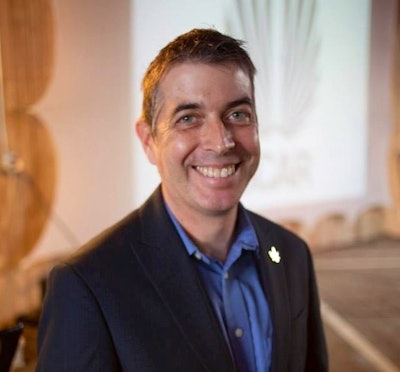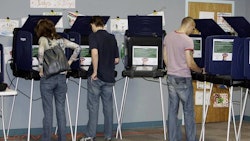
In a candid interview, NORML Washington’s Kevin Oliver says I-502’s full implementation officially begins this month. Plus, he talks about the future of the state’s medical marijuana program, taxes, banking and more.
By Noelle Skodzinski
Washington has stumbled a few times in implementing Initiative-502, which legalized the use and sale, as well as taxation, of recreational marijuana.
The Evergreen State and Colorado were the first states in the nation to legalize recreational marijuana, in the November 2012 elections. Washington’s first legal marijuana sale occurred in July 2014.
Criticism over Washington’s implementation of I-502 began when dispensaries quickly (some within hours of opening) ran out of marijuana to sell. And no supply surge was in sight in the weeks that followed. Media headlines such as "Weedless in Seattle" were widespread.
The state also was criticized by some for its high marijuana taxes, charging a 25-percent excise tax (charged at each stage of growing, processing and selling) and a 9.6-percent sales tax. (For comparison, Colorado charges a 15-percent excise tax, and a 2.9% retail and medical marijuana sales tax, plus a 10% retail marijuana special sales tax.)
Although the two states had no precedents to follow, Washington's bumpy start was viewed by many as a deterrent to I-502’s success. Tax revenue projections of $1 billion in two years were seemingly going up in smoke.
But this is not the case, says Kevin Oliver, executive director, of NORML Washington the state affiliate of National Organization for the Reform of Marijuana Laws. The first six months of I-502 were merely a “dress rehearsal,” he says. “It doesn’t really count as far as the implementation [of I-502], and the technical beginning of the tax revenue and the projections.”
The first budget projections had not yet begun. As of Jan. 1, 2015, stresses Oliver, Washington has worked out the kinks and is poised for rapid growth. “We’ve got 90 stores online and 300 producers licensed, starting now,” says Oliver, who also is a marijuana producer and processor. “We’ve had some growing pains … but the starting gun has gone off to see how effective 502 is in meeting the projections for tax revenue,” he adds. “And we’re off to a great start.”
To date (as of early January), the state has generated more than $17.7 million in excise taxes from the sale of marijuana.
And if Colorado’s success is any indication of whether Washington’s tax-revenue budget projections are realistic, it seems they may be quite ambitious, but are, at least, possible. In 11 months, from January 2014 through November 2014 (the most recent figures available at press time), Colorado brought in $67,594,325 in marijuana taxes, licenses and fees–nearly $68 million. (To put this figure into context: Alcohol sales, use and excises taxes in Colorado generated $39.86 million in the entire year of 2013, as Cannabis Business Times previously reported.)
As Washington “officially” launches I-502, I talked with Kevin Oliver about the state’s bumpy start and what went wrong, about what some of the thorns in I-502’s side are now, whether a rescheduling of marijuana is likely and what that would mean, and the highly anticipated fate of the state’s medical marijuana program, among other things you may not have heard about the industry.
Noelle Skodzinski: Washington was criticized by some for how it got off the ground, especially regarding supply shortages. What’s the supply situation right now?
Kevin Oliver: In July, when they launched the first few stores–and again, they built this from the ground up–stores came online pretty quick. While the producers, a lot of them were outdoor producers, and they weren’t able to get a crop in until now.
So what we’ve seen since July is that there is literally tons more marijuana in the pipeline than there is on the shelf right now. That’s the polar opposite of last July.
In July, if I would have had a fully operational production facility, with bud in bloom, ready to be packaged, I could have named my price and made as much money as anybody’s ever made–$5,000, $6,000 a pound. That’s wholesale. And then the retail price would have been $30 or $40 a gram. That’s what happened in July.
Now, producers are having to beg retailers for a chance to offer them a sample, and they’re lucky to get $6, $7, $8 a gram, because there are hundreds of producers with tons–and with a ton being 2,000 lbs.–literally tons of marijuana ready to go right now.
So, starting now, we’ve got prices at $15, $20 a gram in the retail stores, and I dare anyone to pay less for a gram of marijuana from anyone, anywhere. Especially for this high-quality, tested marijuana that producers are crawling over themselves competing now on quality. For the best marijuana in the world.
Skodzinski: Besides working on the official start of I-502, what are some of the most significant issues NORML Washington is dealing with right now?
Oliver: There are a few moratoriums and bans, mainly in counties where I-502 didn’t pass, per se, even though it passed statewide. There’s been some resistance by several counties that have impeded the process of implementation by not allowing retail stores … or producers to come online, even though they’re licensed and ready to go.
Along the same lines, there’s also been some restrictive zoning that has made businesses find other locations.
So that’s a major concern, and we’re organizing meetings using our email outreach and contacting, through the LCB’s [Liquor Control Board] public records, those people who have a horse in the race … to come together in those counties when there are hearings to try to get some truth in front of decision-makers’ eyes. A lot of their judgment is clouded by prohibitionist fears.
Skodzinski: When I-502 passed, it specified that all marijuana dispensaries had to be licensed under I-502; many, if not most, medical dispensaries are not licensed under I-502. Some legislators and other parties want the medical program dissolved or folded into I-502, since, they say, medical dispensaries are now technically illegal. Can you talk about this and what’s going to happen?
Oliver: Of course the legislative session [kicked] off Jan. 12, and they’re talking about doing a lot of different things.
We’ve got a medical marijuana system in place. We were one of the first states in the country to get that back in ’98. And it’s highly unregulated. … It’s a lot of language that protects from an affirmative defense point–which is a little less than arrest protection–meaning if you’re arrested, you can go to court and be dismissed. We have that protection for patients and providers. …
But in the eyes of the law, technically, they don’t have any kind of protection or structures for regulation, testing, tax revenue. So they’re basically kind of running in the gray area. And they’re largely tolerated because ‘it’s just pot,’ right? And it’s medical marijuana at that.
But one of the things the legislature is starting to work on is that now that we’ve got a highly regulated system that’s collecting taxes for recreational marijuana, they’ve spent millions of dollars on the infrastructure, and we’ve got retail stores that are certified and licensed, the Department of Health is willing to come in with a certification so people could actually talk about medical marijuana in the retail stores, which they’re not allowed to do now.
So commercial producers licensed by the WSLCB [Washington State Liquor Control Board] under I-502 will be able to allocate a portion of their garden for "medical marijuana" to be sold at those retail stores that are licensed by the WSLCB and certified by the Washington [State] Department of Health.
So they’re looking to incorporate the two to protect everyone involved, and that’s a big part of the implementation.
Noelle Skodzinski: What do you think the outcome is going to be?
Oliver: If the legislature does nothing this term, and chooses to just punt the issue, then the Mayor of Seattle has taken the lead and done a fantastic job on outlining a way of protecting the current medical industry as it is, per se.
That being said, the legislature is probably looking at something more along the lines of what Pete Holmes is suggesting. He’s the City Attorney of Seattle. And it’s not to simply take out or wipe out medical. It’s to kind of reallocate and redirect where people would get access to it, and in some cases who would be providing that access–as far as the retail store owners or the producers versus the unregulated commercial grows and … storefronts right now.
Everyone had the same opportunity to apply for a legal license over a year ago. So the medical law itself wouldn’t have to be touched. You could still have the RCW 69.51a in place exactly like it is–which is the codification of our medical law, allowing patients and provider relationships and collectives.
But they haven’t done anything in the law, ever (except for what the Mayor of Seattle is suggesting), to regulate or otherwise license people who are involved in what Pete Holmes suggests is felonious commercial activity.
So all they (the legislature) would be doing is folding the non-regulated commercial medical marijuana industry into the regulated industry.
Skodzinski: What do you think about concerns that medical patients will suffer as a result of integration under I-502?
Oliver: I’m not offering what I think should or shouldn’t be done, but I’m just saying … I don’t think individual patients are going to suffer at all. I think if anybody would suffer through legislative regulation, it would be the people who have made the most money off of the patients in the unregulated commercial system.
What the legislative proposal would offer is that the Department of Health–which again is unprecedented at this point [to have the DOH involved]–would provide training to people who are selling the marijuana at the retail stores to be able to provide bona fide advice on the medical efficacy of different strains.
That training is not being offered now. I would suggest that most of the budtenders don’t have any medical training. There are no regulations that require them to at this point.
It would be great if the Department of Health had already been involved in regulating the dispensaries.
So the retail stores would actually offer a safer product because testing is required, right down to the genetic level. They can tell you what genotype cross it is, how much CBD is in it, how much THC is in it.
There is a best practices in the medical community that offers the same testing that is required by the state for legal stores, but again, it’s only best practices on a voluntary basis, and they’re not held accountable for telling you what you’re getting.
So under proposed legislation, you’d actually be getting a safer product from a more qualified individual. In theory, of course. It looks good on paper.
Skodzinski: So when is this supposed to be decided upon?
Oliver: The legislative session typically lasts three months, so we should know [by February or March or the Spring] if they’ve done anything or are going to punt the issue to a special session later in the year
Skodzinski: What are your thoughts on the state’s marijuana tax structure?
Oliver: … While the tax structure is very steep, the people who wrote the initiative just wanted to sell the initiative through the taxes that way. And then kind of leave it to us, the guys in the field that have to pay those taxes to work it out.
The people who did sign up for it [the business], to be fair, we knew what we were signing up for. And everybody talks about taxes–it doesn’t matter who you are or what industry you’re in–and we’re always paying too much in taxes. But in this case, it is extremely steep and does probably affect the retail price.
So we’d like to have some kind of legislative adjustment from the tax-collection point of view. But this is a budget session. Washington’s state budget is $2 billion in the red, and in my gut, I just don’t think the legislature is going to give us any tax breaks.
Skodzinski: What’s happening with banking in the state?
Oliver: Locally, as a producer and processor, all over the state, there are credit unions that are taking the money. And they’re opening legitimate marijuana accounts, so that you can deposit large sums of cash, it can smell like marijuana, they’ll give you an all clear on your suspicious activity reports–totally transparent.
But if you’re a retailer here, you’re not getting access to banking at the moment, because there aren’t, at the federal level, enough protections.
The credit unions that are happy to take the producers’ and processors’ money know that all of our money came from inside the state of Washington, because it came from retailers who have business licenses in the state.
However, if you’re a retailer, and you’re selling marijuana to somebody from Idaho or Oregon or Montana or wherever they came in from, then they [the credit unions] don’t feel they have enough protection at the federal level to offer those banking services to the retailer because it could be construed as you’re taking money out of state to sell marijuana, and it’s going back out of state. So they don’t even want to go down that route. It’s a hypothesis, but they don’t want to risk any interstate trafficking charges or laundering.
So what’s happening at the federal level this year is the same thing that happened last year, and we’ll have some sponsored bills. One of our state representatives, Denny Heck–he was one of the sponsors last year with [Ed Perlmutter] from Colorado of the Access to Banking Act. … The Act didn’t make it out of the House [last year], and hopefully it will make it out of the House this year.
At the federal level, there have been direct discussions with the banking industry–who wants the money; let’s be totally clear about that. Banks want the money.
But the U.S. Department of Treasury and the Department of Justice haven’t been able to provide anything except guidance, because it’s really going to take an act of Congress to change the law even on banking–without even legalizing marijuana for everybody, just to make it legal for banks to do business with those states that have legalized it.
It’s sticky politics. It takes a long time to move the machine. But look at where we were 10 years ago, and look at where we are now–it’s just worlds apart.
Skodzinski: Do you think there’s a chance marijuana will be rescheduled (from a Schedule 1 drug), and if so, when?
Oliver: Maybe you’ve heard the rumors; I’ve heard the rumors. And you know, it might be nice if, on his way out of office, after the election, with nothing to lose, Obama quietly rescheduled it, through an Executive Order. But that would only do one thing: That would only allow medical marijuana to be rescheduled and then prescribed by a physician. If you take it out of the first schedule, it still is a controlled substance. It’s just not a banned controlled substance.
So what does that mean? … What I see happening with rescheduling is companies like GlaxoSmithKline and GW Pharmaceuticals that have already received patents on pharmaceuticalized cannabinoids and are offering those medicines in other states, who are currently trading on our stock exchanges, I see those companies benefiting from a rescheduling of marijuana as medicine.
It can help the political argument for those states that already have medical marijuana. If the Federal government can reschedule it, then all the states can reschedule it, too. That would still have to be a state-by-state domino effect.
Maybe some states would take the lead and reschedule it altogether within their own borders, and then we’re still left with the same federal conflict that we are now.
The pharmaceutical corporations would have the most to gain from a federal rescheduling.
Skodzinski: What else is important to talk about?
Oliver: I think it’s important that [toward the end of 2014], the DOJ has strengthened its position against going after those people following the law in states that have enacted medical marijuana. So that’s a big positive because in the first term, there were a lot of medical marijuana raids.
Skodzinski: What can the industry do to support NORML Washington and its efforts?
Oliver: Well, we’re a strong supporter of the national office [of NORML] as well, and I’m actually on the national Board of Directors, so we’ve got a great relationship with NORML vertically. But then laterally, we’re really on the front lines. We’re seeing and implementing the changes that they’ve been hoping for the past few decades.
We’ve seen … that the people who are supporting law reform aren’t necessarily supported by the industry. What I’ve seen here and in Colorado, and it’s happening in Oregon and everywhere else, is that hundreds of organizations, hundreds of consultants, thousands of vendors, appear overnight. And it’s like, “Where were you guys during the campaign? Where have you guys been?” It’s a goldmine, it’s a gold rush.
It would be really nice if the industry could find it in their heart to be charitable, to throw down money for those groups that are changing the law. Whether it’s the ACLU or NORML or some other group.
It’d be nice if they kicked down to the cause, or even as a way to say "thank you." It’d be really nice.

























